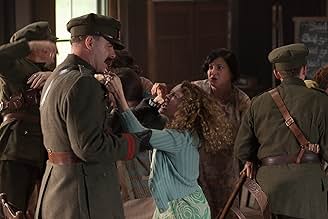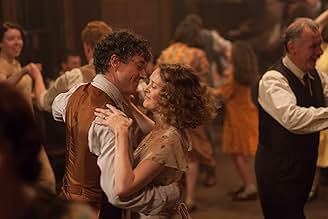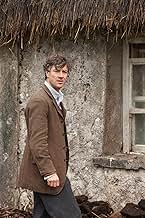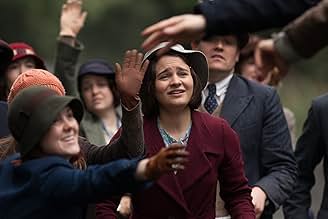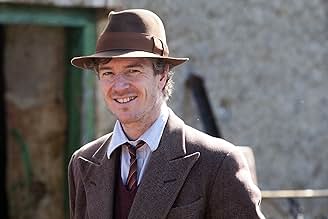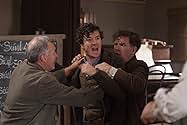Agrega una trama en tu idiomaDuring the Depression, Jimmy Gralton returns home to Ireland after ten years of exile in America. Seeing the levels of poverty and oppression, the activist in him reawakens and he looks to r... Leer todoDuring the Depression, Jimmy Gralton returns home to Ireland after ten years of exile in America. Seeing the levels of poverty and oppression, the activist in him reawakens and he looks to re-open the dance hall that led to his deportation.During the Depression, Jimmy Gralton returns home to Ireland after ten years of exile in America. Seeing the levels of poverty and oppression, the activist in him reawakens and he looks to re-open the dance hall that led to his deportation.
- Dirección
- Guionistas
- Elenco
- Premios
- 2 premios ganados y 3 nominaciones en total
- Dirección
- Guionistas
- Todo el elenco y el equipo
- Producción, taquilla y más en IMDbPro
Opiniones destacadas
One flaw in the movie is that people assume the struggle between Jimmy and the priest is communism versus the church. But Jimmy was not a communist. Jimmy was a grass-roots liberal who supported his community and occasionally spoke out against the concentration of power. The church represents this concentration of power and the struggle to maintain the concentration of power.
During the 1920's, a large percentage of the world's "Wealth" was tied up in speculative investments. Corrupt politicians sided with the land holders and the "Robber barons". By 1924, economic experts started to announce that unfettered greed would lead to an economic crisis in the USA and Europe. In 1929, the US stock-market crash vaporized much of the world's wealth and centralized power among an even smaller percentage of the population.
The movie includes a lot of history that most people in the US and UK who were born before 1977 already know. However, for most of the world, the Irish history and the extent of the struggle between the rich and poor during those times is new.
This struggle continues today. Instead of hereditary land owners, we have large banks and other institutions that "influence" most of the world's "capitalist" governments. The government favors for corporations and privatization of government services that starting in the late 1970's continues to this day and is responsible for the depression of 2008.
Without government support for those who were thrown into poverty, the 2008 depression would have been as bad as the 1929 depression. I think the writers were trying to remind us about the consequences of unfettered greed.
The movie really got my blood boiling even if it was very quiet and slow pace, but it hit some interesting marks about tolerance and freedom of expression. A condition needed by every human. I'm use to seeing rebellions in which people get violent in their protest, but this movie was very tamed, but more importantly, still got the message across.
My favorite part of the movie is the cool Irish music that was featured in the movie.
I like it a lot.
All characters deliver solid to very good performances, the scenario is both subtle and not over- complicated, and the setting is enjoyable, as it offers a unique perspective on the 30's, seen from an agrarian Ireland.
It does have its weaknesses though. The movie starts with a good rhythm, a pace it sadly does not manage to keep. The last third of the movie feels needlessly slow and long.
Another problem is the way this movie seems to deliver a very subjective view of the opposition between the working class and politics.
Still very enjoyable and highly recommended.
It deals with the very specific conflict between those who opposed the Treaty, those who supported it and the dominating Catholic Church when one, Jimmy Gralton, returns from 10 years exile in America and reopens a community hall that was the source of all his trouble in the first place, against the express wishes of 'Holy Mother Church' and those who backed it.
As scripted by Paul Laverty it is, of course, a deeply political film but Loach is the most humanist of political film-makers; consequently it is also a deeply moving (and, at times, very funny) picture. At its centre is a magnificent performance from Barry Ward as Gralton and he is backed beautifully by Jim Norton and Andrew Scott representing the clergy as well as a host of wonderfully naturalistic Irish actors, some professional, some not. Loach may now be in this seventies but this feels as fresh and as relevant as anything he did fifty years ago. I think it's the equal to both "Land and Freedom" and "The Wind that Shakes the Barley".
How did he do that? He set up a dance hall, how scandalous. Whilst by and large the locals embraced it and it provided them with a focal point there was opposition. The church led the way, and some local conservatives followed. By branding them as communists provided their arguments with some supposed gravity. What went on in that hall was open for all to see, yet it met with fierce opposition.
The film puts the two worlds into focus. One view is that change is reprehensible, things ought to stay as they are. The opposing view wants change, people to be free from oppression. The newcomer brought some new ideologies as well as lots of controversy.
Both sides are unchangeable in their positions, no one is prepared to backtrack and a clash is unavoidable. Can the idealist modernist challenge the ultra powerful church orthodoxy?
A mighty tale about old and new in the battlefield of ideas.
¿Sabías que…?
- TriviaThe real Jimmy Gralton was the only Irishman ever deported from Ireland after Irish Independence. After the release of the film, a 2015 campaign (including an online petition) was started with the aim to rescind the deportation order and extend an official apology to his family. In 2016, this resulted in the President of Ireland stating the only deportation of an Irishman from Ireland was "wrong and indefensible." He unveiled a Gralton memorial at Effrinagh outside Carrick-on-Shannon, on the site where the hall once stood. The stone edifice, which tells Gralton's life story as a labor campaigner, was partially funded by the trade union movement.
- ErroresTobacco consumption (cigarettes, snuff and pipes) was extremely widespread at the time, yet none of the characters are seen to smoke, even at raucous social occasions.
- Citas
James Gralton: We need to take control of our lives again. Work for need, not for greed. And not just to survive like a dog, but to live. And to celebrate. And to dance, to sing, as free human beings.
- Créditos curiososAt the end of a long list of people and organizations under the heading "Thank You" in the end credits, Dixie the horse, Cabundie the donkey, and Homer the three-legged dog are mentioned.
- ConexionesFeatured in La noche de...: Jimmy's Hall (2017)
- Bandas sonorasSugar Foot Strut
Written by Harry Myers, Billie Pierce, Charles Schwab, Georges Matis
Used by kind permission of Carlin Music Corp.
Performed by Louis Armstrong & His Savoy Ballroom Five
courtesy of Sony Music Entertainment Inc.
Selecciones populares
- How long is Jimmy's Hall?Con tecnología de Alexa
Detalles
- Fecha de lanzamiento
- Países de origen
- Sitios oficiales
- Idiomas
- También se conoce como
- Özgürlük Dansı
- Locaciones de filmación
- Killanummery, Co. Leitrim, Irlanda(Jimmy's Hall and surroundings)
- Productoras
- Ver más créditos de la compañía en IMDbPro
Taquilla
- Presupuesto
- EUR 6,911,962 (estimado)
- Total en EE. UU. y Canadá
- USD 560,592
- Fin de semana de estreno en EE. UU. y Canadá
- USD 19,881
- 5 jul 2015
- Total a nivel mundial
- USD 4,825,184
- Tiempo de ejecución1 hora 49 minutos
- Color
- Mezcla de sonido
- Relación de aspecto
- 1.85 : 1
Contribuir a esta página




